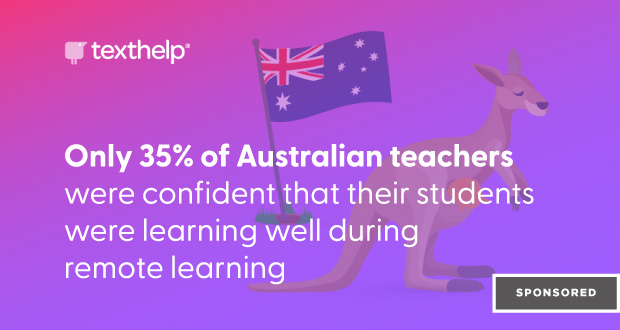Greg O'Connor, Asia-Pacific EdTech Manager at Texthelp
The education sector has undergone a period of great uncertainty and drastic, almost overnight change, driving teaching and learning towards a digital future. With many Australian schools looking to technology as a solution. In fact a research paper published by Texthelp and education analyst ImpactEd, shows how rapidly this idea gained ground this year. The study ‘Lockdown and beyond: Learning in a changing landscape’ found that Australia has outpaced the likes of the UK and US in its adoption of education technology during the COVID outbreak, with a whopping 190% increase in new downloads.
But now that many students in Australia are back in the physical classroom, educators must ask themselves what learnings can we take from the past six months and specifically, how can we use this as an opportunity to implement solutions that improve learning outcomes, in and out of the classroom?
The power of data driven instruction
While there has been much talk about the role data can play in areas such as banking, where 50 per cent of consumers are willing to provide their data in return for rewards, what’s often less discussed, is how data can be used to boost learning and have real, tangible benefits to support Australian teachers and their students.
Bringing education into the digital world provides teachers and students with far greater, and richer, information at their fingertips. Harnessing the power of data driven instruction provides new ways to assess and grade writing, and provide timely, meaningful feedback.
Personalised learning experiences
Learning is an incredibly individual experience, and no two students will learn in the same way. This was evident during remote learning, when some students strived in this new learning environment, while it widened the gap for others.
Although the debate around different learning styles continues in education, what’s clear is that our approach to teaching needs to be personalised to ensure students are gaining the best outcomes. For students, it’s about having the right tools to support them, when and where they need them. Such data driven tools empower students to take charge of their own learning, in turn boosting motivation and engagement.
This is particularly important as research from Texthelp’s study identified motivation as the primary challenge during remote learning. With 80% of teachers in Australia and New Zealand believing that their students would need additional support when returning to the physical classroom. The caveat is that teachers are burnout and need their own support from such tools to do this effectively.
For teachers, it’s not simply a case of saving time using technology, it’s also about making adjustments to their style of teaching based on the feedback they receive. If an instruction isn’t hitting the mark, teachers can make swift changes to their lesson plans to make a greater impact.
Not a one size fits all approach
While the power of data can create real, tangible improvements, it’s important for educators to consider that it’s a lifelong journey to improving learning outcomes. It will never be a case of adopting a tool and then standing back to let the technology do the work: it’s a case of continual adjustment, training and improvement, with upskilling teachers being an integral part of this. And most importantly it needs to be driven by evidence based teaching practices.
Last year, the Data Quality Campaign conducted research into the use of data to improve teacher practices and student outcomes, finding that of those teachers polled, 86 per cent stated that data was important to their effectiveness. Ultimately, the opportunities are too vast to avoid harnessing data driven improvements within education. While the adoption of technology should never be a one size fits all approach, and requires continual adjustments and upskilling - don’t our students deserve this opportunity at our fingertips?
To learn more about Texthelp’s study and their data-driven writing instruction tool WriQ, click here.
Do you have an idea for a story?Email [email protected]
 Education Review The latest in education news
Education Review The latest in education news
